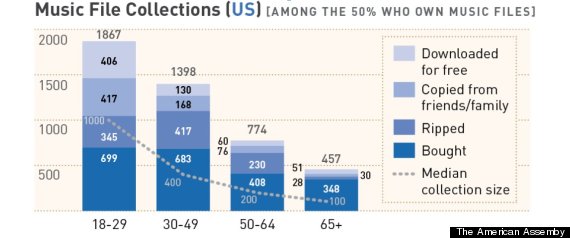
While record companies are quick to blame slumping sales within the industry on music-stealing pirates, a recent study suggests these moochers may also be some of the best customers.
New statistics from The American Assembly show the highest consuming free music downloaders also purchase about 30 percent more music, making pirates the biggest spenders in the record industry.
The American Assembly is a public affairs forum and affiliate of Columbia University. Two consecutive blog posts from this organization examine where music collections originate and if illegal file sharing should be deemed "wrong."
TorrentFreak reports this particular study is preview data for the soon-to-be-released Copy Culture Survey. The research was comprised of thousands of telephone interviews that provided a "unique insight into the sharing habits" of music aficionados living in the U.S. and Germany.
In this first chart, the information explains how people accumulate their music library. Notice the dark blue portion of the graph shows which tunes were purchased, while the lightest two sections show how many songs were downloaded for free or copied from friends and family. This data means people in the U.S. still get their music "predominantly through legal sources -- bought directly or ripped from one’s own CDs."
The research also breaks down consumers into a "high-piracy" group, called P2P users, and a "low-piracy" group, dubbed the non-P2P users. Check out the chart below, which illustrates the larger amounts of legal music pirates purchase. These P2P user statistics (highlighted in the first and third columns) clearly trump the music purchases of non-P2P users (shown in the second and fourth columns):
Here are a few other interesting facts from The American Assembly blog:
- Thirty to 49-year-olds have a significant amount of music that is not digital, proving this age group is still transitioning within the United States participants.
- Both U.S. and German 18 to 29-year-olds are more likely than any other age group to engage in copying music "from family and friends" or downloading it for free.
- The study suggests that copying music from friends and family "is comparable in scale and prevalence" to downloading tunes for free.
Still, the Recording Industry Association of America states that illegally downloading even just one song is "devastating" to the music industry, and that piracy in general leads to a $12.5 billion dollar loss in the U.S. economy, per the company website.
New York Magazine also recently published a look into the "new math" of the music industry, finding that sales of No. 1 albums have shrunk significantly since 1991. At that time, Paula Adbul's "Spellbound" sold 88,000 copies. In 2011, Taylor Swift's "Speak Now" only sold 52,000 -- and yet both artists can claim the No. 1 spot.
What do you think about music piracy? Where's the line between hurting the sales of artists you enjoy verses grabbing a few free downloads? Sound off in the comments section, or tweet us your opinions at [@HuffPostTech]. Then read about the new Xbox Music service (here), or flip through our slideshow of the top nine illegally downloading countries (below).


